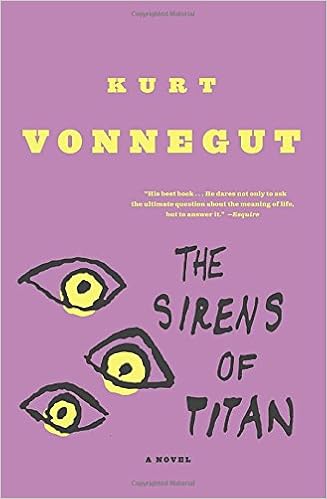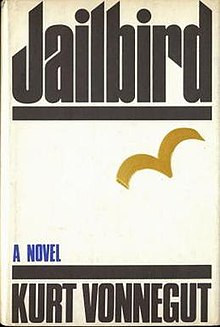 After reading The Sirens of Titan here is my ranking of all of his novels I’ve read so far, starting with the best:
After reading The Sirens of Titan here is my ranking of all of his novels I’ve read so far, starting with the best:
- Slaughter-house 5 — There are too many reasons this one is my favorite, read it yourself to find out.
- Breakfast of Champions — The pictures are hilarious, Trouts novel summary’s are so spectacular, and Vonnegut as a character is just great.
- Cat’s Cradle — Bokonism is so inventive.
- The Sirens of Titan — See below.
- God Bless You, Mr. Rosewater — It really isn’t fair for this one to be last, but one had to be and this one wasn’t really focused on Mr. Rosewater for many parts. It’s hard for me to recall what happened in the novel, as it didn’t really stick to it’s plot. The ending is great though, and Eliot Rosewater is one of my favorite Vonnegut characters.
I put Sirens of Titan fourth for a couple reasons. The characters were all interesting, but Winston Niles Rumfoord, who started out nice enough in the beginning, went absolutely crazy. The book took a wild turn, traveling to Mars where Winston was staging a full-on invasion of Earth, designed to fail and unite Earth with one religion in the process. This went into a very dark portrayal of the military, with each soldier being controlled by an antenna in their heads. One part I of this I enjoyed a lot was Vonnegut’s imitation of a snare drum:
“Rented a tent, a tent, a tent; Rented a tent, a tent, a tent. Rented a tent! Rented a tent! Rented a, rented a tent.”
Kurt Vonnegut
Malachi Constant, the main character also called Unk and Space Wanderer, started out incredibly rich and lucky at the beginning. Much of this novel seems to be about luck. Vonnegut, similarly to Cat’s Cradle, creates a new religion: The Church of God the Utterly Indifferent. This religion, created by Rumfoord, is absolutely opposed to Constant, precisely because of his luck. Though I disagree with that God is indifferent, Vonnegut’s point throughout the novel is compelling and should be addressed. Vonnegut talks a lot on the topic of luck, and how some seem to have lots of good luck, while others have almost none.
John Rawls based much of his philosophy on righting this philosophical idea of luck called the Birth Lottery.
Some people end up worse off than others partly because of their bad luck.
-Kasper Lippert-Rasmussen
Vonnegut suggests that people are just favored by God and naturally lucky. The last line even says “…somebody up there likes you.” This idea of natural luck and favor bestowed by God is satirized throughout the novel.
One of my favorite part’s of this book was Salo, the Tralfamadorian. The Tralfamadorians are by far on of the most interesting aliens Vonnegut has created. In this book, the Tralfamadorians have been changing the course of human existence in order to get Salo to send a message across the universe. Also, it is said that the Tralfamadorians are machines, which relates to Dwayne Hoover’s belief that everyone else are machines in Breakfast of Champions. There is a great part in Sirens of Titan where Salo betrays his machine instincts (which are to follow orders) to show Mr. Rumfoord the message he is supposed to be sending, and the message is great.
Another thing I did notice in The Sirens of Titan, was the mention of the planet Betelgeuse, which is also mentioned in The Hitchhiker’s Guide to the Galaxy. Coincidence? I think not.
Lippert-Rasmussen, Kasper, “Justice and Bad Luck”, The Stanford Encyclopedia of Philosophy (Summer 2014 Edition), Edward N. Zalta (ed.), URL = <https://plato.stanford.edu/archives/sum2014/entries/justice-bad-luck/>.



 After reading The Sirens of Titan here is my ranking of all of his novels I’ve read so far, starting with the best:
After reading The Sirens of Titan here is my ranking of all of his novels I’ve read so far, starting with the best:
 On another note, I watched the film adaptation after reading the novel, which is just as good, if not better. I think I liked the movie better, only because I understood more of what was going on, which only happened because I read the book first.
On another note, I watched the film adaptation after reading the novel, which is just as good, if not better. I think I liked the movie better, only because I understood more of what was going on, which only happened because I read the book first.
